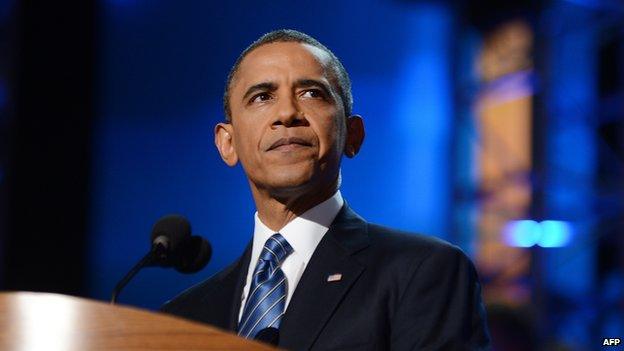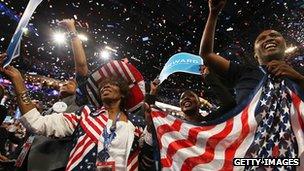Obama's rhetoric is clever but no game changer
- Published
- comments

"Four more years," they chanted as he walked on stage. But he began slowly.
It was as though the president had deliberately clipped his own wings, refused to soar too much, offering little inspirational rhetoric that could be mocked by his opponents.
The first half of his speech was no more than workmanlike, but it stressed the idea that this election was a choice between two very different Americas: "Ours is a fight to restore the values that built the largest middle class and the strongest economy the world has ever known."
He didn't quite offer blood, toil, tears and sweat, but he suggested this wouldn't be easy.
There was a promise of a set of new economic goals if he won again, but no detail on how they would be achieved.
Mockingbird
There wasn't much to satisfy those who ask what exactly President Obama's second term would look like - not at least in concrete terms. This was a speech about values.
"If you reject the notion that this nation's promise is reserved for the few, your voice must be heard in this election. If you reject the notion that our government is forever beholden to the highest bidder, you need to stand up in this election."
He mocked his opponent Mitt Romney:
"You might not be ready for diplomacy with Beijing if you can't visit the Olympics without insulting our closest ally."
He also claimed Mr Romney and the Republicans had one main policy: "All they have to offer is the same prescriptions they've had for the last 30 years. Have a surplus? Try a tax cut. Deficit too high - try another. Feel a cold coming on? Take two tax cuts, roll back some regulations, and call us in the morning."
Despite some good passages like that one, the speech was frankly, rather flat at this point.
But then Mr Obama started cooking. This was the turning point:
"We don't think the government can solve all of our problems, but we don't think the government is the source of all of our problems - (cheers, applause) - any more than our welfare recipients or corporations or unions or immigrants or gays or any other group we're told to blame for our troubles."
Long, hard slog
The president unleashed himself, just a little. I had been wondering how he would cope with "hope and change".
I thought there might be an electric moment, admitting people's disappointment, a moment of self-revelation and humility.

President Obama said the election was not about him, but about the American people
There wasn't, but the speech did get better.
He had a clever rhetorical device - the American people were the change; they inspired him with hope.
"I have never been more hopeful about America - not because I think I have all the answers, not because I'm naive about the magnitude of our challenges. I'm hopeful because of you."
Inside the hall, they loved it. That was almost a given.
After the ovation they played Bruce Springsteen's We Take Care of Our Own, a brilliant, bitter, ironic take on American patriotism.
It asks, without spelling it out, why love of country does not always include caring for the people who make up the country.
It neatly echoes the values Mr Obama had been talking about. The key question is how this speech will go down with people who voted for him last time, but feel let down now.
He certainly presented a clear picture of what he saw as Mitt Romney's faults, his experience and their different visions.
But this was no game changer. It suggests the election campaign, like improvement in the economy, will be a long hard slog.
UPDATE: Unemployment numbers
Unemployment has "edged down" to 8.1% in the US, external. There were those who said in advance that today's figures were more important for November's election than anything that happened at the party conventions.
They are either "further evidence that the US economy is continuing to recover from the worst downturn since the Great Depression", or evidence of a "weak economy and the 43rd straight month of unemployment above 8%".
You won't be surprised to know the first is the White House's take, and the second, that of the Romney campaign.
Both seem to be true - it is a question of a glass half-empty or half-full.
These figures are pretty so-so, and unlikely to change people's general impression of the economy. The drop in unemployment is because fewer people are actively looking for work.
The increase in employment was 96,000 jobs in August, lower than some expected. The number of unemployed, 12.5 million, hasn't changed much.
And you have to remember the figures are often revised - indeed, those for the two previous months have been, external - fewer jobs were created than reported at the time.
Some economists worried by this data because it seems to confirm the picture of a recovery that is very slow, although at least not going in the wrong direction.
Both Mr Obama and Mr Romney will be out on the stump today, and I'll be looking for new ideas from either of them to get the job market moving.